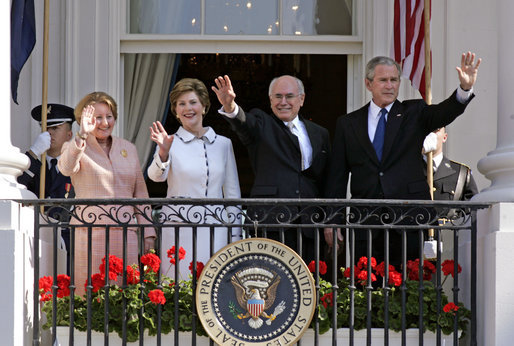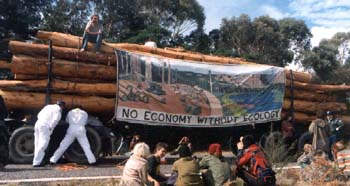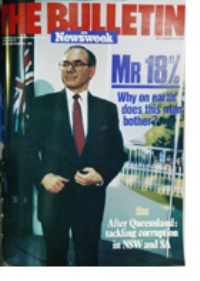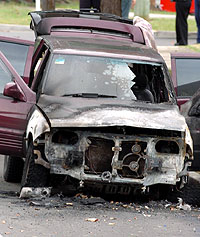Mood:
Topic: aust govt
* Will the Howard Years episode one deal with a story that 4 Corners was too scared to cover - Jabiluka Uranium mine beaten by the traditional owners, national green groups and NT progressives? This was 1996 to 1999 but in particular mid 98. This set the scene for the Shane Stone Country Liberal Party being beaten in the Statehood referendum and then losing the govt to Clair Martin's ALP. But it all started with the Jabiluka blockade in our humble view and we played our part as a legal adviser taking time out from Waverley as Bondi Ward councillor.
* Pre emptive attack on local councils via AFR story about cost savings by amalgamating councils. Be careful what you wish for - like social security local councils are the democratic social fabric of society. Sure after a GFC it's tempting to cut costs but then so is the slippery slide to Mussolini making the trains run on time.
* '400 Bob Jellys are meeting in Canberra'. So funny. As compared with 'the shallow craven 400 Mike Moores' from the Big Media who live and work there week in week out??? And yes we did do our 4 years tour of duty as a local councillor at Waverley as per the plaque on the library in Bondi Junction.
* Fed Govt backups purchase of Toorale with water rights from Tandou, at 250 gigalitres for $34M 'to buy back the floods'.
* The current reportage of a past period of grim contest ALP versus Coalition Greiner-Fahey Govt from 1991-1995 has lacked a bit of context to our way of thinking:
15 Nov 2008 That one day in September - National - smh.com.au
There was not only the assassination of MP John Newman in Sept 1994. In the highly political role as NSW campaign coordinator for The Wilderness Society we can say it was like hand to hand trench combat with dueling fax machines and talkback via such as newly invented broadcast fax via single coded sheet. To be frank the death of one obscure MP was a side play to power wrestle with the National Party over statewide policy on land use on forest, logging and wilderness, and the 'minor' matter of the Wood Royal Commission into the Police. Then there were the horror bushfires of summer 1993-4 to recover from. All this was in the backdrop of Greiner effectively sacked by his own side of politics in 1992 after the Metherell Affair was referred to ICAC.
As regards the Newman murder we got to reflecting that regardless of the intent of the accused/convicted Ngo his high status calls up a sense that any particular criminal might have wanted to appease the Big Man with or without his endorsement. As soon as Della Bosca let Ngo in on Newman's shaky preselection such a rumour could have run and run fast even within hours, including to sinister forces wanting Ngo in place regardless. Newman famously campaigned against organised crime and stated to camera such crims 'didn't fear gaol only deportation to the jungles of Vietnam'. The question is whether Ngo or any other was in on it, and who was the actual shooter.
* We commented in Sunday Talkies on the glowing profile of Kathy Ridge as the acceptable face of the green and reconciliation movement who interestingly grew up to some degree in the shadow of Ok Tedi environmental disaster. Good to see Carol Ridgeway-Bisset native title claimant for Stockton Bight based at Nelson Bay in the story. There is no doubt since Senator Kerry Nettle of The Greens crashed in the last Federal Election this state of NSW is missing the alpha female Green MP at federal level. Or any Green MP at NSW federal level. And one reason we suspect for that election loss is the colonisation of Nettle's office by the CFMEU with their coal and woodchippiong record. So regretable. We took a pic of her senate shopfront post federal election with dead pot plants in the window as some kind of metaphor.
Or maybe Ridge is being positioned to replace aging Jeff Angel or indeed shell shocked Ian Cohen MLC?
* The lack of ethical framework of Tim Blair and perhaps News Corp itself was clear to see with the juxtaposition of a feature about Obama "Living in the line of fire" Sat Daily Telegraph p85 15 Nov 08 while next page Tim Blair ran cartoon (for mental age of reader) graphic for story "Puppy love with a bang" and "Obama is the best gun salesman we've had". Thank God TB's gun totin fans didn't win the USA election.
* Laurie Oakes has a balancer last Saturday ameliorating the favouritism of PM's wife launching his book Power Plays. We thought that was too close for real independence and stand by that. So Laurie leads with gibe against PM while Rudd is out of the country "Don't say anything, Rudd's in the Room" as if to set the scales to sceptical equilibrium again. Noted LO, noted.
* Interesting biofuel story targetting non agricultural land .... maybe ....
15 Nov 2008 Oil from wasteland tree to power Air NZ jet | The Australian
* Twiggy Forest is now officially not so rich, down $11 billion to $1 billion in personal wealth. So sad. Actually it really might be given his support for 50,000 jobs in the Indigenous population will be mightily affected. That really is sad.
Forrest down to his last billion as freeze sets in | The Australian 14 Nov 2008
* Biggest con job in modern political economic history? The coal industry have received legislative approval to write off future risk of CO2 leakage in the future. That explains the 4 full page adverts so far explaining why they are doing alot to combat climate change ....not. The adverts are in sky blue format or is that Liberal Party blue?
We think the world and Australia will live to regret such a free pass for the coal sector, and Senator Milne (Greens) is right. We think the underground reservoirs will leak as night follows day, probably kills hundreds or more in the process, which is why the Europeans don't like it. Meanwhile the coal sector's main concern is expansion at any democratic cost
16 Nov 2008 Roozendaal declares war on wealth in state budget | The Australian
as some ten thousands march against warming last weekend:
13 Nov 2008 Business splits on carbon deadline Dennis Shanahan, Political editor DIVISIONS are emerging in the nation's peak business body over the Rudd Government's 2010 deadline for a carbon trading scheme, with...
But here's the point: state governments aren't national governments and most economists agree that what state governments should do with their budgets during downturns in the economy is different from what national governments should do.
Why? Because we live in a national economy, not six state economies. There are no economic barriers between the states and much economic activity flows over state borders.
State government budgets are heavily affected by the economy's movement through the business cycle, particularly on the revenue side. In a downturn, collections from the goods and services tax and payroll tax will grow less strongly and collections from stamp duty on conveyances of residential and commercial property will dive because far fewer properties change hands.
So state governments' operating budgets - which cover their everyday operations, not their investment in new capital works - deteriorate sharply, with surpluses quickly turning to deficits.
My view is that governments should live with such deficits because to try to correct them by means of spending cuts and tax increases would be "pro-cyclical" - it would make the downturn worse - and possibly counterproductive, in that the negative effect on the economy could leave you with a bigger deficit not a smaller one.
In other words, state governments should allow their budgets' "automatic stabilisers" to work unhindered, thus helping to prop up the economy. (The quid pro quo is that state governments should run large operating surpluses during the good years, with the surplus used to help finance that year's capital works spending.)
I don't think it's good practice for state governments to do what a national government would do: go a step further with discretionary spending and tax cuts to actually stimulate economic activity.
Why not? Because a lot of that stimulus could leak over the border into other states, because state governments have less capacity to borrow than the national government and their budgets have less ability to rebound in the upturn. That's how the Cain government in Victoria got itself into so much bother in the recession of the early 1990s.
The one qualification I'd make is that state governments with infrastructure backlogs should increase their capital works spending during recessions.
Why? Because the time when private sector construction activity has fallen off is the ideal time for the public sector to fill the gap, limiting unemployment in the industry and getting things built when costs are lower and there's little risk of inflating prices.
The NSW mini-budget doesn't involve cutting back capital works spending until 2011 - which is too far into the future to worry about - but it does involve significant spending cuts and tax increases intended to reduce the operating deficit, thus making it pro-cyclical. Why do such a thing? Because the rating agencies have threatened to downgrade the state's AAA credit rating. The whole purpose of the mini-budget was to avert that.
But is it worth paying such a price to retain the top rating? That's a question too few people ask. Watch this space.
The reaction of the Secretary to the Federal Treasury, Ken Henry, is worth noting, however. He said on Wednesday it was important for NSW to retain the top credit rating, while acknowledging that the mini-budget could well have an impact on the macro economy.
However, he said, the Federal Government stood ready with further budgetary stimulus if needed.
In other words, the management of demand and the smoothing of the business cycle was a job for the Feds, not the states (and the Reserve Bank, of course).
There you have it: this mini-budget is about nothing other than doing "whatever it takes" to prevent a downgrading in the state's credit rating. All the rest is either detail or spin. ......
But for the Rees-Iemma-Carr Government there can be no debate. Its reputation as a manager of the state's affairs is already so tattered that to suffer a credit downgrading would be the last nail in its coffin.
Rightly or wrongly, it would be taken as the ultimate, irrefutable proof of the Labor Government's economic incompetence.
Sorry, but Nathan Rees and the union bosses who appointed him just aren't prepared to run that risk to their survival in office.
And if it makes the downturn worse rather than better for the people of NSW, that's just something the people of NSW will have to cop.
At a time when the Federal Government is busy increasing its spending - and rapidly turning a surplus into a deficit - to bolster the economy during the downturn, it may strike you as strange that its state counterpart is doing the opposite: cutting spending and increasing taxes.
You're right, it is strange. Perverse, in fact. Eric Roozendaal says this is a tough budget for tough times. A snappy line, but treasurers haven't believed it made sense since the same mentality helped to prolong the Great Depression.
Quoting ex Premier Greiner "You cannot have a proposal that goes from being right to wrong in a fortnight. It means there is no systematic plan for NSW and government departments don't know what they are supposed to be doing."
Excuse me, tell that to Lehman Bros. Merrill Lynch. Fannie Mae. Freddie Mac. Countrywide Financial. Bear Stearns. American Insurance Group. And then there was Enron all those years ago. Or HIH here.
Greiner and Kelly have selective memory when it comes to an ALP nominally Left Govt. If the GFC can knock $40B off federal budget projections than a fortnight can knock off the north west metro and it did knock it off.
Kelly then contradicts NSW roundsman from the same paper Imre Salusinszky 2 weeks back that conceivably Rees could go ahead of Rudd in a deal possible under the NSW Constitution. That is due to flexibility in a clash with any federal election in Feb March 2011 and Rudd technically can wait until April 2008 as well. Imre confirms these theoretical views by phone today while noting everyone expects Rudd to go late 2010. But will he?
In Sunday Talkies we also noted: "Paul Kelly hopelessly flawed article in The Australian yesterday. Airbrushes real NSW political history regarding Greiner years - seeking to buy off Metherell's vote on forest destruction by job sinecure in the EPA, over feisty public servant Neil Shepherd. Carr winning on the green vote - narrowly. Falsely conflating two very different energy sell off proposals 1997 to 2007-8 with a $10 billion disjunct in the assets (no transmission infrastructure in the second). Greiner being a big business lackey in name as well as substance today working for British American Tobacco. Kelly needs a good spanking."
* Someone called "Herman Daly, former senior economist of the World Bank, did the maths years ago" says Leslie Cannold in Sun Herald 9 Nov 2008 at p8 of Extra: "He argues that catastrophic climate change is just one manifestation of our tragic miscalculation. .... The economy is not just killing the planet. It's killing the economy." Quite.








